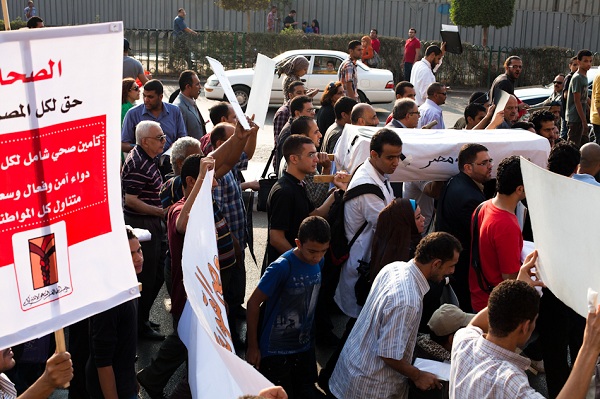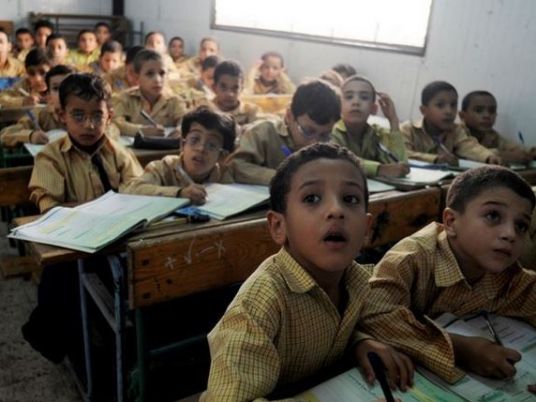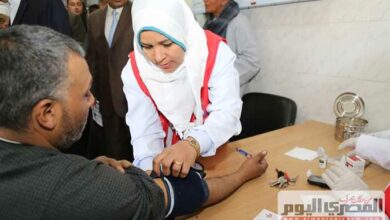
Protesting doctors held a symbolic funeral service for the Egyptian health system at Omar Makram Mosque after afternoon prayers on Thursday. Doctors wore black clothes underneath their white coats, some carrying a symbolic coffin as they chanted, "There is no god but Allah! The health system is dead!”
Taher Mokhtar, a member of the Alexandria Doctors Syndicate and the supreme committee for the strike, said, “At the beginning of the strike, we said the health system was in decrepit condition and needed quick resuscitation to come back to life. But now that the regime has ignored our calls for help, we today announce the death of the health system and that a new one should be established to give citizens their rights to health care."
Forty-two days have passed since the doctors announced their strike at the beginning of October, but even that span of time was not enough for the Health Ministry to make changes satisfactory to the doctors. Striking doctors have been calling for the ministry's share of the national budget to be raised to 15 percent and for hospitals to be secured. Doctors also demand new terms of employment. The ministry, meanwhile, has refused to negotiate with the strike committee, saying it is illegitimate.
The Doctors Syndicate board did not participate in the symbolic funeral. Abdallah al-Keryouny, a member of the board, said the funeral would have been more appropriate under the rule of ex-President Hosni Mubarak and not under today’s elected government.
“The syndicate is the legitimate entity supervising the strike. Undoubtedly, there is corruption permeating the health system, but the ministry is taking action to achieve the doctors' demands as it faces resistance from those who do not want reform. We support the strike and will continue it, but it is more important to know how to gain your right than to demand it,” he said.
Several political powers participated in the funeral, including Strong Egypt, the Socialist Popular Alliance and Wasat parties, the Revolutionary Socialists and independent political activists.
Alaa Abd El Fattah, a political activist, described the steps taken by the government to increase doctors’ salaries without addressing core issues as "tranquilizers" intended to soothe the angry doctors.
The Health Ministry earlier announced that it had put together new terms of employment for doctors. Abdel Hamid Abaza, assistant health minister and the head of the committee preparing the new terms of employment, told Egypt Independent that the committee is now writing up the new terms. But, the new terms of employment have yet to be approved by the legislative branch, currently represented by President Mohamed Morsy.
The government also announced the establishment of a new Interior Ministry department whose job is to secure hospitals. This department has already gone to work, though attacks on hospitals continue to occur.
On 30 October, a patient and his relatives assaulted a doctor at the Bulaq Public Hospital because a specific drug the patient needed was not available. Even though the emergency and reception departments of hospitals are working normally during the strike, doctors at the Bulaq hospital have suspended work at these two departments until the hospital is properly secured. The Qasr al-Aini French hospital was attacked three times over the past three weeks.
Fighting back tears, Mona Mina, a member of the strike committee, said, “We are sad because our demands are just and we are presenting solutions. But, the lack of response on the part of ministry officials and their refusal to sit with us means that they have chosen to scapegoat the doctors and the entire health system.”
“When we talk to them, they say we are not legitimate. We have been struggling since Mubarak all the way through the interim period and up to this moment, yet nothing new is happening.”
Amr al-Shoura, press spokesperson for the strike committee, said the minister and other officials' interests constitute impediments to the introduction of genuine reform because many of them work for private hospitals, so it is in their interests to maintain a poor level of service at public hospitals.
Ahmed Abu Bakr, a member of the Cairo syndicate board, said the Health Ministry's disregard of the strike demonstrates the lack of genuine political will on the part of decision makers to introduce radical change as demanded by doctors.
“It is impossible to expect a response because a response would indicate that the decision-making centers have changed, which is not the case,” he went on. “Those who fed like parasites on the devastation of the health system and those who have benefited at the expense of citizens cannot possibly be the same people who lead reform now.”
The current health minister was an assistant to the Mubarak-era health minister, he pointed out.
Following the afternoon prayers, the funeral proceeded from Omar Makram Mosque, located a few meters off Tahrir Square, to the Egyptian Radio and Television Building, Maspero, where the doctors decided to dump the coffin into the Nile while chanting against the health minister.
Shoura says that the current health minister worked at the Specialized Medical Center’s secretariat when Hatem al-Gabaly, the Mubarak-era minister, was in office. He has also worked at the private Dar al-Fouad Hospital, the biggest cardiac hospital in Egypt, which was founded by Gabaly. He is also a partner in a number of private analysis laboratories.
There have been no real changes of Health Ministry officials, added Shoura, saying that the former assistant health minister for financial affairs, also a former military general, was replaced with another officer. Some medical syndicates chiefs were given posts in the ministry to reduce syndicate pressures on the ministry. Abdel Nasser Saqr, the current Giza syndicate chief who is also a member of the Muslim Brotherhood, was appointed a deputy health minister in Giza.
Bakr added that while the doctors' demands are ignored, those of the army, police, judiciary and university professors were satisfied and their salaries raised. He believes that the government wants to bolster support in these areas.
Many of the protesters said they fear that the government has a long-term vision to privatize the health service. Abaza, of the Health Ministry, denied the charges.
He also said that the ministry's budget cannot be raised this year, since the state budget has already been approved and that several other sectors are similarly suffering.
Abaza denied allegations that some officials want the health system sabotaged to achieve their private interests. He also said there are no corrupt officials in the ministry and called on those making the accusations to present documents proving their claims in order for the alleged corrupt officials to be held accountable.
Commenting on that point, Abu Bakr said, "We do not need documents to prove corruption at the ministry. But we can talk about corrupt policies, for instance when you go to a hospital you are asked to get out all the money you have to be examined. Those who set such policies are enemies of humanity — there cannot be examination fees at hospital receptions."
Shoura agrees with Abu Bakr: “There is clear evidence of their failure — when an official is sick, he or she gets treatment abroad or at a private hospital because they know that public hospitals pose a threat to the lives of patients.”
Translated by Dina Zafer




